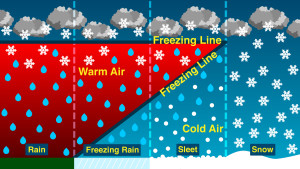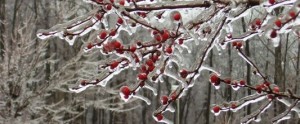If you want snow or sleet or freezing rain, you’re gonna be happy. Heck, if you want a low of zero, you’ve got a chance for that too!
Following along the thinking of last evening’s post, the next 7-10 days should be the heart of our winter…certainly from a cold standpoint.
First things first…tomorrow night’s storm. As previously noted, the timetable has been edged earlier over the past couple days such that we should see light snow breakout in the Triangle tomorrow afternoon sometime between 4 and 6pm. Expect the event to be winding down early Tuesday morning from west to east.
As goes climatology, so goes the setup in precip type corridors for this storm. That is, north and west toward Greensboro and the Va border will feature the greatest percentage of snow, transitioning through sleet and freezing rain as you go south and east. Everybody wants to know what will end up in their backyard, of course. Here’s what I’m going to tell you. It won’t really matter that much. Most of NC will end up seeing a major impact event. And it doesn’t matter that much if you have 4″ and ice on top vs if you have 1″ of snow plus an inch of sleet plus .25″ of ice. It’s all a mess. And yes, I understand that all snow is much better to deal with than ice. Of course. I’m just saying this will be a widespread event where NC comes to a standstill for a couple days.
With the above in mind, let’s try to call it for the Triangle and then you can extrapolate geographically from there. Precip begins as light snow late afternoon…then a snow/sleet combo thru the evening with accumulation of snow and sleet 2-3″. By midnight there should be a freezing rain/sleet combo or even periods of just freezing rain that will add at least a tenth of ice glaze, possibly up to 1/4″. Maybe a flurry near the end on Tuesday AM. There could even be a lot of variance even across just Wake County…the north west part might get 3″ of snow/sleet and just a little glaze, while the south east portions end up getting 1/2″ of snow sleet and 1/4″ or more of glaze. Hopefully, we can better define these zones later tonight and tomorrow.
Two notes: 1) Since the ground is already going to be very cold, and since the precip is arriving late afternoon when the sun is setting…the snow and sleet will sticky very quickly to everything. Plan to be home before it begins in earnest early evening. 2) The good news about last night’s wind rage is that it took out lots of weak limbs that would be the first to go in a significant glazing situation.
Many winter events in NC come and go with their effects leaving just as quickly. Not so this time around. Air even colder than what we have today is set to come in behind tomorrow’s system. All the snow and ice will be with us for the week with highs struggling to get out of the 20s on Thurs and morning lows getting awfully close to 0…yes, zero Fahrenheit.
Finally, just something to keep an eye on…there are indications in the medium to long range that while the bitter cold relaxes at the end of this week…there may be a couple more opportunities for winter weather next weekend and the following week.







Recent Comments